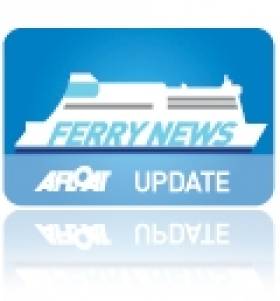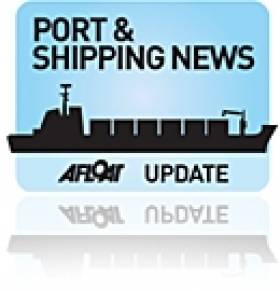Displaying items by tag: Interim Statement
#ICGinterimStatement – Shipping, transport and leisure operator, Irish Continental Group (ICG) has issued this interim management statement which covers carryings from 1 January to 9 May 2015 and financial information for the first four months of the year, i.e. 1 January to 30 April.
It should be noted that ICG's business is significantly weighted towards the second half of the year when normally a higher proportion of the Group's operating profit is generated than in the first six months.
In the period to 9 May 2015, Irish Ferries carried 94,800 cars, an increase of 8% on the previous year. Total passenger volumes increased by 3% compared to the previous year to 418,600.
In the Roll on Roll off freight market, Irish Ferries carried 91,800 units, an increase of 11% compared with the same period in 2014.
Container freight volumes shipped were down 1% on the previous year at 100,000 teu (twenty foot equivalent units), while units handled at our terminals in Dublin and Belfast increased 3% year on year, over the same period to 67,400 lifts.
In the first four months of the year, Group revenue rose 7.3% to €85.1 million, compared with €79.3 million in the same period last year. Operating costs (before depreciation & amortisation) were 1.6% lower at €74.8 million, versus €76.0 million the previous year, mainly reflecting the lower cost of fuel. Earnings before interest, tax, depreciation and amortisation (EBITDA) was €10.3 million compared with €3.3 million in the same period in 2014. The operating profit (before interest) was €4.4 million compared with an operating loss of €2.3 million in 2014. Net debt at the end of April was €45.5 million compared with €61.3 million at 31 December 2014.
Following the completion of an extensive tender process by Belfast Harbour Commissioners, ICG announces that it has been awarded the Services Concession for the operation of a combined container terminal at Victoria Terminal 3 (VT3) in Belfast Harbour. The agreement is for a period of 5 years with a further 3 year option. This will involve the consolidation of the two existing container terminals in Belfast (one of which, BCT, is operated by ICG) into one location at VT3. The process of consolidating the volume of both terminals, which will involve some once off costs, will commence shortly.
Interim Managment Statement
Volumes (Year to date, 9 May 2015)
Change
Passengers: 418,600 +3%
Cars: 94,800 +8%
RoRo Freight: 91,800 +11%
Container Freight: (TEU) 100,000 -1%
Terminal Lifts: 67,400 +3%
Note: The comparative financial information has been restated to the 30 April 2014 which is on the same basis as the current year. In the previous year the financial information disclosed in the interim management statement for the first four months of the year was up to the 26 April 2014.
#ICGinterimstatement – Irish Continental Group (ICG) has issued below this interim management statement which covers carryings up to 17 May 2014 (i.e. 20 weeks) and financial information for the first four months of the year, i.e. January to April.
Volumes (Year to date, 17 May 2014)
Change
Passengers: 441,100 (0%)
Cars: 95,000 (+5%)
RoRo Freight: 87,900 (+18%)
Container Freight (TEU): 107,800 (+1%)
Terminal Lifts: 69,700 (+6%)
It should be noted that ICG's business is significantly weighted towards the second half of the year when normally a higher proportion of the Group's operating profit is generated than in the first six months.
During the period we inaugurated our weekly Dublin to Cherbourg service, operated by the recently chartered 'Epsilon', alongside 8 additional round trips on Dublin-Holyhead. Total sailings operated across all routes were up as a result by 17%. The financial results for the four months reflect the additional costs of operating the 'Epsilon' during the start-up phase on both the Dublin-Cherbourg and Dublin-Holyhead routes.
In the 20 weeks up to 17 May 2014, Irish Ferries carried 95,000 cars, an increase of 5% on the previous year. While car passenger numbers were up, in line with the car volumes, total passenger volumes were in line with the previous year at 441,100 due to a fall in foot passenger carryings.
In the Roll on Roll off freight market, Irish Ferries carried 87,900 units, an increase of 18% compared with the same period in 2013, reflecting the additional capacity of the 'Epsilon' and a growing freight market.
Container freight volumes shipped increased 1% to 107,800 TEU (twenty foot equivalent units), while units handled at our terminals in Dublin and Belfast rose 6% year on year, over the same period, to 69,700 lifts.
In the first four months of the year, Group revenue rose 5.8% to €76.7 million, compared with €72.5 million in the same period last year. Operating costs (before depreciation & amortisation) were 9.0% higher at €73.8 million, versus €67.7 million the previous year, mainly reflecting the incremental operational and port costs of operating 'Epsilon'.
Earnings before interest, tax, depreciation and amortisation (EBITDA) were €2.9 million compared with €4.8 million in the same period in 2013. The operating loss was €2.6 million compared with an operating loss of €1.1 million in 2013. There was a net finance charge of €1.7 million, down €0.3 million compared with the previous year. The loss before tax was €4.3 million (2013: loss of €3.1 million).
Following the (previously announced) accelerated receipt of charter hire on the deferred sale of the vessel, 'SPL Princess Anastasia' (formerly Pride of Bilbao), to St Peter Line of St Petersburg, Russia, the Group's net debt at the end of April was €72.3 million compared with €93.4 million at 31 December 2013.






























































